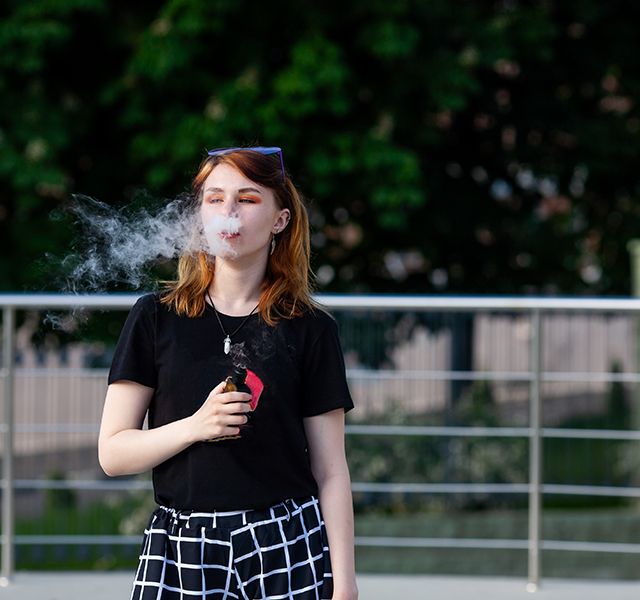It’s a tough time to be a teenager. The nation’s youth are in the midst of what some experts have called a mental health crisis. According to government data, 40% of U.S. high school students have persistent feelings of sadness or hopelessness. And many young people report feeling stressed out by things like schoolwork, college applications, family tension and events like climate change or school shootings.
To take the edge off, some adolescents are turning to substances including marijuana or nicotine vape pens. “Young people might think that using substances helps them relax,” says Allison Tripi, D.O., a pediatrician at Henry Ford Health. “But in fact, it often makes mental health problems worse, and can cause risks to their health both in the short and long term.”
Adolescent Stress and Substance Use
When a young person turns to vaping or uses marijuana, it can be hard to tease out why. Are they using drugs recreationally or attempting to self-medicate problems like depression or anxiety?
Teen substance use often overlaps both of those reasons, Dr. Tripi says. “Most kids think they’re getting some benefit from it,” she says. “But whether they’re trying to deal with mental health challenges or responding to peer pressure, there are better ways to cope.”
Drug Use in Adolescence: The Risks of Self-Medicating
A lot of people think nicotine and marijuana just don’t seem that risky. Kids might reason that both are natural products from plants. Plus, both are now legal in many states, at least for adults. “But just because they’re legal doesn’t mean they’re safe—especially for people whose brains are still developing,” Dr. Tripi says.

Need A Pediatrician?
Cigarettes and e-cigarettes are associated with a laundry list of health problems, from increased risk of heart attack and stroke to lung disease to cancer. Unfortunately, many people who start using the products find it hard to stop. “Nicotine is extremely addictive,” Dr. Tripi says.
Marijuana is also associated with short- and long-term problems. Whether the products are inhaled or swallowed, marijuana use in adolescents can lead to multiple harms:
- Executive function problems: Marijuana can impair executive functions like attention, decision-making and memory. That can cause problems in school and increase the chances of making unsafe decisions, like risky driving.
- Poor mental health: Marijuana use has been linked to depression and social anxiety. It can increase the risk of temporary psychosis (hallucinations or confusion about what’s real and what isn’t). It also increases the chance of developing schizophrenia, a serious mental illness that causes hallucinations, delusions and breaks with reality.
- Addiction: People who start using marijuana in adolescence are more likely to develop cannabis use disorder. The risk is greatest for young people who use the drug frequently, but anyone can develop addiction.
- Brain changes: During adolescence, the brain is changing rapidly. Using marijuana during this time can cause changes in brain connections important for memory, learning and attention. These changes could be long-lasting—and maybe even permanent.
What Parents Can Do About Substance Abuse
Kids naturally start to pull away from their parents in adolescence. Still, parents often have a lot more influence with their teens than they realize. There are things parents can do to help kids manage stress and steer them away from substance use.
- Teach coping skills: Preventing substance use is always better than dealing with it after the fact. One way to do that is by helping kids develop healthy coping skills that they can turn to in hard times. “You can teach kids to learn to relieve stress through exercise and activities like music, art or whatever else brings them joy,” Dr. Tripi says.
- Walk the walk: Part of teaching healthy coping skills is showing how you manage stress in your own life. “When you’re stressed, do you reach for a glass of wine or relax by listening to your favorite music?” she asks. Look for better coping strategies the family can share, like taking a walk or watching a funny movie. “Time is a luxury, but it’s worth trying to carve out some positive family time,” she adds.
- Watch for red flags: Keep an eye out for warning signs that your child might be dealing with a substance use problem. Some of those signs include: acting hostile or uncommunicative, changes in friend group, isolating themselves, lying or acting secretive, missing school or a drop in grades, withdrawn or depressed mood
- Get help: If you are concerned about your child’s mental health or substance use, there are many sources of help available. Consider talking to your child’s pediatrician, school counselor or a therapist.
- Talk (and listen): Parents are often tempted to punish kids for substance use. But if the goal is to get them to stop, it’s usually better to ask questions to understand why they’re doing it—and help them see why it’s harmful. “Try to get at the reasoning behind the substance use,” Dr. Tripi said. If they are using substances to deal with stress or mood problems, help them find healthier alternatives. “Encourage honesty and let them know you’re there to help,” she added.
“Luckily, parents don’t have to be perfect,” Dr. Tripi adds. “Just being there for them as a reliable source of love and support can do a lot to buffer a child’s stress.”
Reviewed by Allison Tripi, D.O., a pediatrician at Henry Ford Medical Center - Hamtramck.



